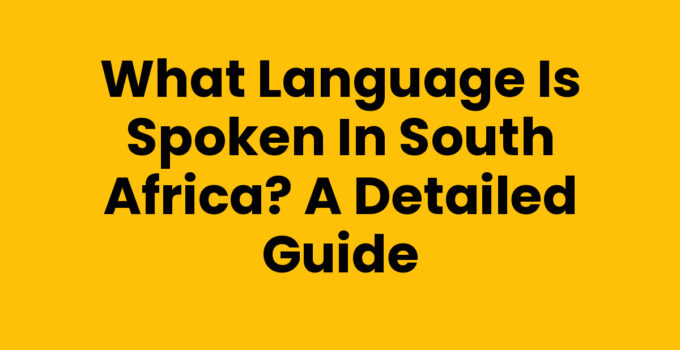South Africa is a vibrant nation known for its rich cultural diversity, which is reflected in its languages. With 11 official languages, the country is a linguistic tapestry that showcases its historical heritage and contemporary social landscape.
What Language is Spoken in South Africa: An In-Depth Look
When considering what language is spoken in South Africa, one must acknowledge the profound multicultural background of the nation. The 11 official languages are:
- Afrikaans
- English
- isiNdebele
- isiXhosa
- isiZulu
- Sesotho
- Setswana
- siSwati
- Tshivenda
- Xitonga
- Sepedi
Each language is a key component of South Africa’s identity and history. Let’s break them down:
Afrikaans
Afrikaans is a derivative of Dutch and spoken primarily in the Western Cape and Northern Cape. It’s the third most spoken language in South Africa and has a rich literary history.
English
English serves as a lingua franca in South Africa, used in business and government, and spoken widely, especially in urban centers.
Indigenous Languages
Languages such as isiZulu, isiXhosa, Sesotho, and Setswana represent the rich indigenous cultures of South Africa. isiZulu and isiXhosa are among the most widely spoken, having millions of native speakers.
Each language not only stands as a means of communication but also as a cultural emblem. For instance, isiXhosa is known for its intricate click sounds, and the vibrant traditions associated with the language speak to the heritage of the Xhosa people.
Learning these languages can open doors to understanding South Africa’s vast cultural narratives and histories. Programs in schools often encourage bilingualism or multilingualism to promote inclusivity and unity.
Check This: What Language is Spoken in Bloemfontein? A Detailed Insight
The Importance of Language Diversity in South Africa
The linguistic diversity found in South Africa plays a crucial role in shaping societal interactions and cultural exchanges. Here are a few reasons why this diversity is significant:
- Cultural Identity: Languages carry traditions, stories, and cultural nuances. Speaking an indigenous language fosters a strong sense of belonging.
- Social Cohesion: Understanding multiple languages encourages dialogue and collaboration among different cultural groups.
- Preservation of Heritage: Language is key to preserving the arts, folklore, and history of a community. Efforts to promote local languages are critical against globalization.
Further Reading: List Of Top Pet Shops In Bloemfontein, Pet Stores Near Me, 2025
Learning Languages in South Africa
If you’re interested in learning South African languages, numerous resources are available:
- Language Schools: Many cities have language schools offering courses in various South African languages.
- Online Platforms: Websites and apps like Duolingo and Rosetta Stone have modules on South African languages, making it easy to learn from anywhere.
- Community Programs: Engaging in community events can provide practical language experience in a social setting.
Learning the local language can immensely enhance your experience, whether you’re traveling or residing in South Africa. It fosters a deeper connection with the people and their culture.
In conclusion, the question of what language is spoken in South Africa unveils a complex interplay of historical, cultural, and social factors. Understanding and embracing this linguistic diversity is essential for appreciating South Africa’s richness.
Final Thoughts
As South Africa continues to evolve, its multitude of languages will remain an essential part of the nation’s fabric, inviting everyone to participate in its ongoing story.
You Might Also Like: Best Coffee Shops in Bloemfontein for Every Coffee Lover
Frequently Asked Questions
What are the 11 official languages of South Africa?
The official languages are Afrikaans, English, isiNdebele, isiXhosa, isiZulu, Sesotho, Setswana, siSwati, Tshivenda, Xitonga, and Sepedi.
Why is language diversity important in South Africa?
Language diversity promotes cultural identity, social cohesion, and preservation of heritage among the country's different communities.
How can I learn South African languages?
You can learn through language schools, online platforms, and community programs that offer language courses and cultural immersion.



